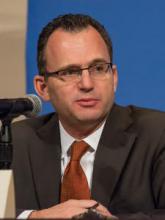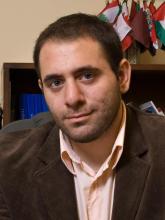In this week's Monday Briefing, MEI experts Paul Salem, Yousef Munayyer, and Randa Slim provide analysis on recent and upcoming events including the meeting between Egyptian President Sisi and President Trump, the upcoming meeting between President Trump and Jordan's King Abdullah, and the Trump administration's adoption of Obama-era policies in Syria.
U.S., Egypt Back in Business
Paul Salem, Vice President for Policy and Research
Egyptian President Abdel Fattah el-Sisi’s visit to Washington signals the restoration of the close U.S.-Egyptian relations that have been a key pillar of U.S. policy toward the Middle East for four and half decades. The United States has an abiding interest in a stable, prosperous and well-governed Egypt, and Egyptians have an interest in close relations with the United States’ government, economy and society.
The United States and Egypt agree on the need to defeat terrorism, to push for a more moderate Islamic narrative, to end civil wars and stand up failed states, and to reduce interstate proxy wars. Both leaders understand the urgency of rekindling economic growth and job creation. They also agree on the need for progress on the Israel-Palestine and Israel-Arab peace process.
With regard to areas of difference, it is natural that the two capitals see the world and their own priorities through different lenses. The United States is critical of the Egyptian government’s record on democratization and human rights; Cairo is critical of any external meddling in Egyptian internal affairs, but it is more urgently critical of Washington’s drift away from the two-state solution in Israel-Palestine and the risk of moving the U.S. embassy from Tel Aviv to Jerusalem.
Today’s meeting between Presidents Trump and Sisi is an opportunity to communicate to our respective publics that Washington and Cairo are back in business. The signal is key to U.S. allies and friends in the region, including Israel and the Arab Gulf states, who believe a strong Egypt is vital to their security, and to the restoration of stability in the chaos-torn Middle East.
Read "America and Egypt Need Each Other" by Paul Salem and Frank G. Wisner in The National Interest.
King Abdullah in Second Visit to Trump White House
Yousef Munayyer, MEI Scholar
Along with Egyptian President Abdel Fattah el-Sisi this week, President Donald Trump will also meet with King Abdullah of Jordan, while senior Fatah official Jibril Rajoub will be in town meeting U.S. officials ahead of a visit by Mahmoud Abbas in the days to come.
For King Abdullah, fresh off hosting the 34th Arab League Summit in Amman, this will be his second trip to meet with Trump since the inauguration in January. Lodged between Iraq, Syria, Palestine and the Gulf, Jordan is surrounded by volatile political and military situations and is sure to have regional security and stability at the top of his agenda with the White House. Part of this is seeking assurances that the president will not make the mistake of moving the U.S. embassy to Jerusalem. With right-wing extremist David Friedman recently being confirmed and heading for the region in the coming weeks to represent Washington in Israel, as well as the 50th anniversary of the Israeli occupation of East Jerusalem, an embassy move would add to regional discontent.
Also coming to Washington to discuss Palestine is Jibril Rajoub, a Mahmoud Abbas confidant who was recently elected to the third highest ranking position in a Fatah party that is under both internal and external pressure to change and seems to be doing its best to resist on both fronts. Rajoub’s visit may be aimed at facilitating the upcoming meeting between Abbas and Trump, which will serve as an opportunity for the Palestinians to assess the seriousness of this White House in engaging in a peace process.
Trump Adopting Obama Policies on Syria
Randa Slim, Director of the Initiative for Track II Dialogues
Last week, the Trump administration publicly embraced policies which the Obama White House pursued covertly. On Thursday, U.S. ambassador to the U.N., Nikki Haley, said the priority was no longer "getting Assad out." U.S. Secretary of State Rex Tillerson added that “the longer-term status of President Assad will be decided by the Syrian people,” adopting a position which has long been advocated by Assad's protectors in Moscow and Tehran.
Inaction and/or delayed action by the Obama administration at critical junctures in the past six years of the Syrian conflict made this outcome inevitable. There is no longer a realistic path to an inclusive political transition that preserves Syria’s territorial integrity. Unless the Geneva process turns into a platform for negotiating the Syrian opposition’s terms of surrender, this process is practically over.
While a unilateral regime military victory will remain difficult for the foreseeable future, the days of the armed opposition posing an existential threat to the Assad regime are over. These groups will continue to mount surprise attacks on regime strongholds as we have seen them do recently in Hama and around Damascus. But the conflict trajectory has shifted irreversibly in the regime’s favor. The critical decision now facing the pro-Assad coalition is no longer about which constitutional /political reforms the regime can live with. It is about which parts of Syria the regime can live without.
The future form of Syria depends partly on this decision, and partly on how the United States and Turkey sort out their differences about the future of the Syrian Kurdish zone, including who will rule Raqqa after its liberation from ISIS.
The Middle East Institute (MEI) is an independent, non-partisan, non-for-profit, educational organization. It does not engage in advocacy and its scholars’ opinions are their own. MEI welcomes financial donations, but retains sole editorial control over its work and its publications reflect only the authors’ views. For a listing of MEI donors, please click here.
















